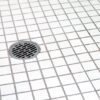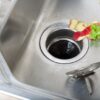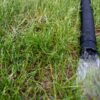Category: Winter Plumbing
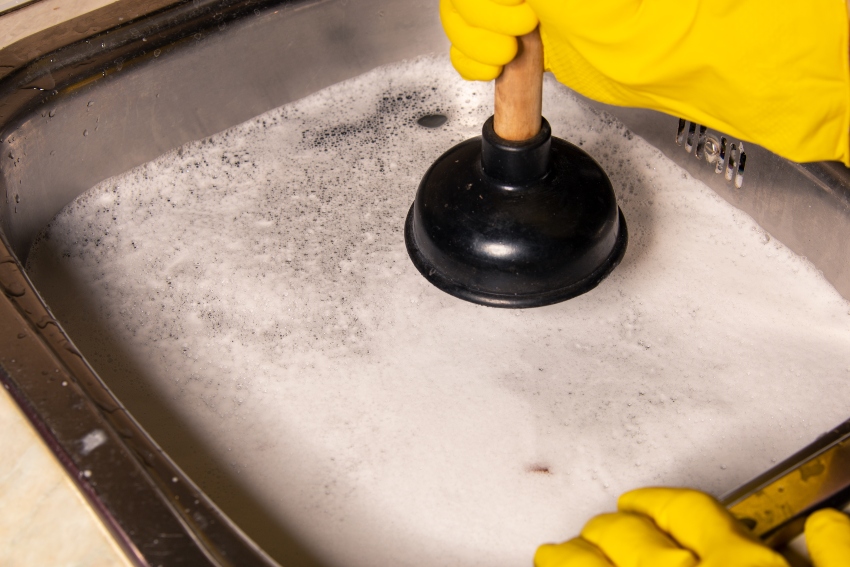
Winter Plumbing Maintenance Reminders
Winter is extra tough on our home’s plumbing system, and we’re currently in the middle of the season’s coldest months. Follow these winter plumbing maintenance reminders to help avoid major issues and costly repairs.
Protect Your Pipes from Freezing
Frozen pipes are probably the most common winter plumbing problem, especially here in Minnesota. When the temps drop way down and harsh winds blow, the plumbing in exterior walls is at an even higher risk. Follow these guidelines to help prevent frozen pipes:
- Keep the furnace running. If you want to lower the thermostat at night or when you’re away, it’s recommended to go no lower than 55 degrees (closer to 60 if extreme cold and high winds are expected).
- Open kitchen and bathroom cabinet and closet doors. This allows warm air to reach and circulate around the plumbing.
- Leave faucets dripping/trickling overnight. On extremely cold nights, allowing the water to run, even minimally, helps prevent them from freezing.
Be sure you know where your home’s main water valve is located for quick, easy access should a pipe freeze or burst. In that case, close the valve and call your local plumber.
Keep Your Drain Lines Clear
Food particles, soap scum, hair, and other debris naturally collect in pipes over time and cause clogs. They’re more susceptible in winter, however, as the cold, harsh weather can stiffen and solidify these blockages more rapidly. Professional drain cleaning service is recommended every two years, and you can help keep your drains clear with these tips:
- Use strainers to catch common blockages. Debris can’t collect and clog your drain if it doesn’t get in to begin with! Cover sink and tub drains (especially in the bathroom and kitchen where they’re used most often) with strainers to collect large particles and then toss them in the trash.
- Never dump fats, oils, or grease down the drain. These are common clog culprits because they cool as they move through the pipes, coating the interior walls, solidifying, and building over time. These items should be disposed of in the trash – if they’re hot from cooking, collect them in an empty jar or coffee can to cool first.
- Don’t dump coffee grounds down the drain or garbage disposal. Since coffee grounds don’t break down in water, they don’t grind up and wash away like other food particles. Instead, they clump together and form a clog over time. Throw old coffee grounds in the trash rather than down the drain.
- Pour hot or boiling water down drains, especially in the kitchen. Not only will this heat up the cold pipes and help loosen any gunk buildup, hot water also makes the natural oils of food products move faster and more easily through the drain. However, use cold water while running the disposal to prevent those oils from liquefying and adhering to the blades.
- Use baking soda and vinegar for a homemade drain cleaner. Store-bought drain cleaners may help clear clogs, but they can also eat away at the pipes themselves. Instead, pour 1/2 cup of baking soda down the drain, followed by 1/2 cup of vinegar, and then let it sit for at least 30 minutes before rinsing with a pot of boiling water. Vinegar’s acetic content makes it an organic solvent that will naturally break down buildups in the pipes, and the baking soda absorbs odors to help keep the sink smelling fresh.
Remember that garbage disposals are designed for grinding and draining scraps of food, so large pieces should be scraped into the trash. Try to get dishes as clean as possible before washing to limit the amount of debris getting into your drain. If you experience clogs, backups, or other drainage issues, contact your local drain cleaning pros at Robillard.
We’ve made it through the holidays and into 2021, but there are still plenty of cold days ahead of us here in Minnesota. Use these winter plumbing maintenance reminders to help prevent inconvenient issues and expensive repairs or replacements.
For all your plumbing service and product needs, trust the experienced master plumbers at Robillard. Contact us today to learn more.
Read More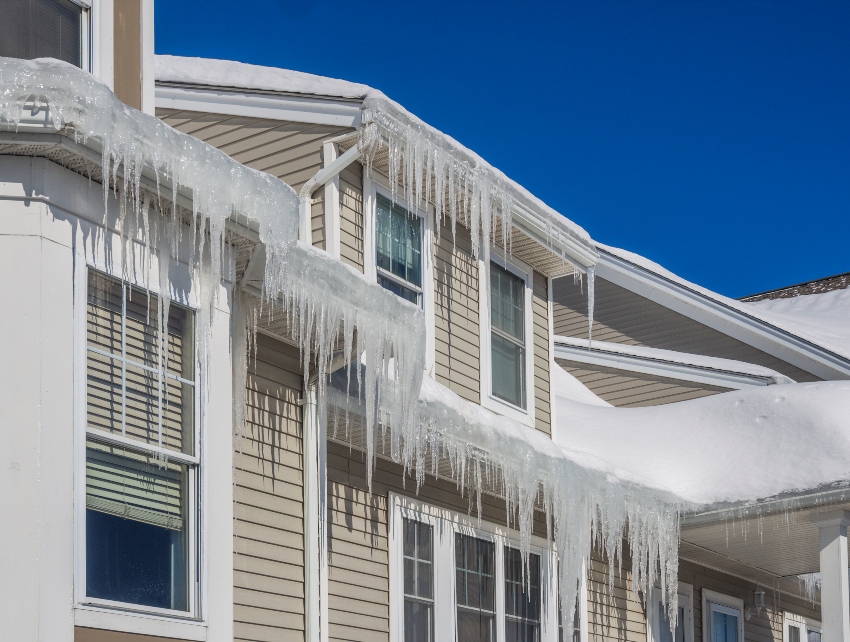
6 Winter Plumbing Issues You Shouldn’t Ignore
Minnesota’s extreme winter weather puts extra stress on plumbing systems. With the holiday season, winter vacations, and other distractions, it’s easy to overlook warning signs that seem to be minor inconveniences. However, these small annoyances may indicate bigger problems that can lead to serious damage and costly repairs if left unaddressed. Here are six winter plumbing issues you shouldn’t ignore.
Snow and Ice Buildup on the Roof
Roofs are built to face and protect our homes from mother nature, but they’re not indestructible. Year-round exposure to the elements takes its toll on your roof, and excessive snow and ice buildup increases the risk of damage and even collapse. Signs your roof is under too much stress and needs snow and/or ice removed include:
- Creaks, pops, and other unusual noises coming from the roof or attic
- Water stains, bubbling, and other signs of an active leak on walls and/or ceilings near roof
- Ridges of roof that seem to be sagging
- Area(s) of roof appearing to bend inward
Staying ahead of buildup is the best way to prevent issues. Remember to clear your roof off after the first heavy snowfall and continue doing so throughout the season. However, if you notice any of these warning signs during winter, it’s recommended to contact a professional roofing contractor ASAP for snow/ice removal. They will have the proper equipment, training, and experience to do so safely and correctly.
Slow or Clogged Drains
Clogged drains can happen any time of year as soap scum, hair, food particles, and other debris collect in the pipes. However, the bitter cold and harsh winds of winter can stiffen and solidify these blockages, as well as combine them with frozen water to completely clog a drain. Keeping drains clear, especially in bathrooms and kitchens with pipes located in exterior walls, so water can easily pass through will help prevent freezing.
If you encounter a clog in winter, try using boiling water to thaw the obstruction. If the problem persists, contact your local drain cleaning specialists to properly diagnose and fix the issue. Remember that you shouldn’t use chemical solutions as they can eat away at your pipes and do more harm than good.
Leaking or Slow-Draining Garbage Disposal
Leaking, slow-draining, and clogged garbage disposals are pretty common and usually a pretty easy fix. However, if left for too long, they can lead to larger problems that require a full replacement or cause expensive water damage.
Leaky Garbage Disposal
- Due to natural wear-and-tear over time, leaks commonly develop in several areas of the disposal:
- Sink flange: uppermost area of the disposal, which goes through the sink
- Gasket: top rim of the disposal, where the rubber seal mounts to the flange
- Dishwasher connection: rubber hose that carries wastewater from the dishwasher to the disposal
- Discharge drainpipe: plastic pipe that carries wastewater from the disposal to the sink’s drain trap
If you notice any of these issues, contact your local plumber now before the problem gets worse. Fixing these leaks typically requires replacement of an old, worn part and can save you the time, hassle, and cost of a more expensive repair or replacement down the road.
Slow-draining or Clogged Garbage Disposal
Don’t make the mistake of thinking your garbage disposal is indestructible. Food, grease, and other obstructions can collect in your garbage disposal over time and cause slow draining or even a wastewater backup. Fixing this issue usually requires cutting power to the disposal, disassembling the drain trap and discharge pipe, and clearing out any blockages. If you notice drainage issues and want help, call the drain cleaning experts at Robillard.
Especially around the holiday season, it’s important to remember that disposals are meant to grind and drain scraps of food, not entire plates or meals. You should dispose of food waste in the trash before washing dishes, and never put coffee grounds or eggshells down the garbage disposal.
Water Temperature Issues
With colder water being delivered to your water heater in winter, the system works even harder to keep up with the hot water demands of the household. The extra stress increases the risk of failure, so keep an eye out for these water heater warning signs:
- Not having enough hot water for daily use (i.e. showers, laundry, dishes, etc.)
- Frequent and sudden changes in water temperature
- Water dripping from and/or pooling around water heater
- Loud cracks, pops, gurgling/boiling, and other unusual noises coming from water tank
- Smelly or discolored water (i.e. rusty tints)
Don’t suffer through cold showers or stinky, dirty water, especially as these could possibly point to larger issues with your source water. Trust the master plumbers at Robillard to identify and correct the problem so your family can enjoy warm, clean water throughout the home.
Weak Water Pressure
Decreased water pressure is a pain at any time of year, and during winter, this can be a sign of a frozen pipe somewhere in the system. Again, pipes in your exterior walls are more susceptible as they have less insulation and more exposure to the cold outdoor air and windy weather. Address the problem immediately before you’re left with a burst pipe and expensive water damage.
Weak water pressure can also be caused by an issue with your water softener, such as a clog in the sediment filter or resin bed or a leak. If you’re experiencing water pressure issues, call Robillard today and one of our plumbing experts will diagnose and fix the issue ASAP.
Unexplained Water Bill Spikes
An unjustified spike in your water bill is an unpleasant and costly surprise indicating a problematic change in your plumbing system. Using humidifiers is common in the winter, so remember that running them 24/7 will naturally increase your costs. A bill being much higher than expected could indicate a burst pipe, but the issue can usually be traced to something smaller like a leaking or running toilet or a water softener leak.
Winter brings its own unique challenges to our daily lives as well as our home’s utility systems. There’s no way to guarantee a problem-free season but knowing what to look for can help prevent major complications. Keep an eye out for these common winter plumbing issues to catch minor troubles before they become big, costly problems later on.
The master plumbers at Robillard Plumbing have proudly served customers throughout the northwest Twin Cities area since 1986. We take pride in providing efficient, effective plumbing services with a focus on reliability and customer care. Contact us to learn more.
Read More
